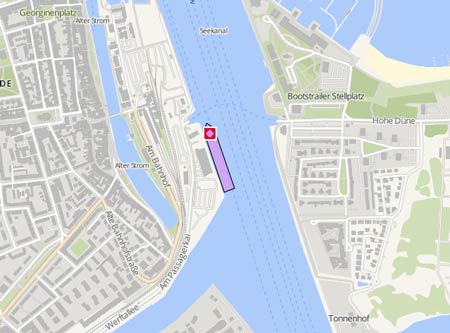CROWN OPAL
Course/Position
4 hours ago
Latest ports
Latest Waypoints
Latest news
Divers found drugs attached to hull
The Colombian Navy informed on Jan 28, 2017, that they found and seized 67 kilos of cocaine hidden in a cylinder, which was attached to the underwater hull of the "Crown Opal". The cocaine was destined for Belgium. The reefer had left Santa Marta on Jan 26. Navy divers searched the hull in the Gulf of Uraba. On Jan 29, the vessel was under way in the Gulf of Uraba, heading for Moin on Jan 29 with next calls at the Dominican Republic, UK and finally, Belgium. SHip and crew were cleared of suspicions in drug trafficking involvement.
Cargo shift caused ship arrest
The "Crown Opal" was temporarily marooned after its arrival in New Bedford on Feb 2, 2015, while the shipping company demonstrated that it is adequately insured to absorb the losses incurred when the ship met with 25-foot seas, causing massive shifting of the cargo toward the aft of the ship. The Maroc Fruit Board, based in Morocco, the company that hired the ship alleged in a federal court filing in Boston that the shippers failed to properly secure the cargo, resulting in major shifting of the cargo and extensive damage to the lower decks as well as to the fruit aboard. The court at mid-week ordered a maritime arrest of the vessel to prevent it from going anywhere while the paperwork is put in order to cover all potential losses, estimated in the lawsuit at $3.2 million to $4.4 million in U.S. dollars. The "Crown Opal" was docked at State Pier for about 10 days before it was moved out of the way to make room for another ship carrying clementines, the "Green Honduras". The "Crown Opal" remained at anchor in the middle of Buzzards Bay. The crew has mostly been sent home. Pierre Bernier, logistics manager of Maritime Terminal, which offloaded the ship, estimated that a third of the cargo was affected, with pallets strewn around the ship and internal mesh decking collapsed. The ship's crew along with local longshoremen were set to the task of repacking the pallets the best they could while the extreme cold put the brakes on offloading for days. The ship was carrying approximately 3,000 pallets of clementines, and the damage kept crews from using forklifts to speed up the offloading. Gross shifting of pallets was discovered upon opening cargo holds number 1, 2 and 4 on Feb. 3. In hold No. 1, virtually all pallets shifted towards aft, with numerous collapsed pallets in stow. As discharge was delayed as longshoremen were working to restack shifted/collapsed pallets, it was noticed that the pulp temperature of the fruit was rapidly decreasing due to extreme low ambient temperatures. The hatch cover was ordered closed as a result while the crews restacked damaged pallets. Damage was similar throughout the ship, and offloading went very slowly, further subjecting the fruit to extreme cold. The effort and cooperation by the longshoremen and the Ukrainian and Filipino members of the ship's Crew were praised. The extent of damages and liability will have to be worked out in federal court. In the meantime, other clementine-bearing ships bringing fruit from Morocco and Spain will continue to arrive in New Bedford with cargo destined mainly for the Canadian market.
Upload News

